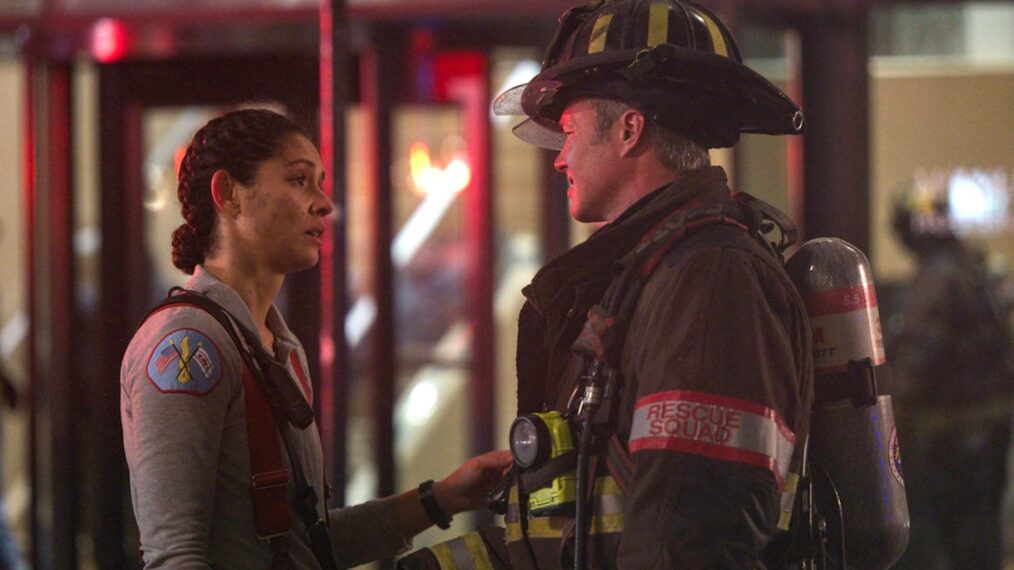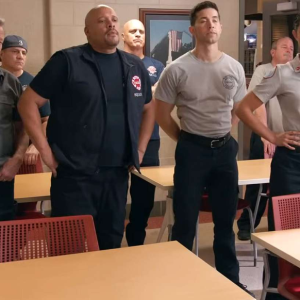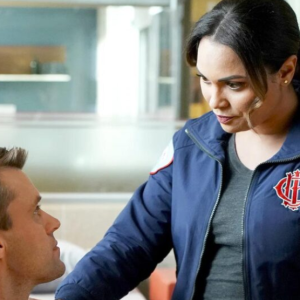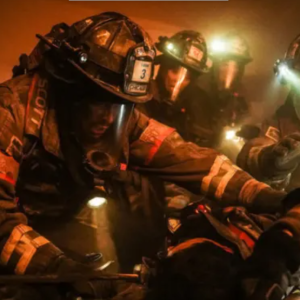As the flagship show in the One Chicago franchise, Chicago Fire has weathered many changes over the years. Despite the numerous cast reshuffles and character exits, Kelly Severide (Taylor Kinney) and Stella Kidd (Miranda Rae Mayo) have remained the heart and soul of Firehouse 51. However, with the departure of several key players, the show is facing a growing concern: can Severide and Kidd alone carry the series for the long haul?
Severide and Kidd’s Romance: The Heart of Chicago Fire
The relationship between Severide and Kidd has been at the forefront of the show’s storytelling for some time now. Unlike other Dick Wolf procedurals, Chicago Fire tends to focus heavily on character relationships, with romances playing a central role. While the relationships of other characters, like Herrmann and Cindy or Mouch and Trudy, are important, they don’t receive the same screen time or emotional depth as Severide and Kidd’s. With the wedding of Severide and Kidd marking a new chapter, the series has placed significant emphasis on their evolving dynamic.

However, while their relationship is a major storyline, it can’t bear the weight of the show alone. Fans have been invested in the couple’s journey, but as we enter Chicago Fire season 14, the show’s focus on their relationship is starting to feel stretched. The show has little else to offer in terms of active romance storylines now that Casey and Sylvie Brett’s marriage has ended and other potential love stories, like that of Carver and Violet, are left unresolved due to the characters’ exits.
Departures Shake Up Chicago Fire
The departures of key characters like Sam Carver (Jake Lockett) and Darren Ritter (Daniel Kyri) are bound to leave a gap in the show’s ensemble. While these characters weren’t as prominent as Severide and Kidd, their exits put extra pressure on the remaining core characters to fill the void. For instance, Carver and Violet’s slow-burn romance was a significant subplot that could have added depth to the show, but now that Carver is leaving, that storyline is left incomplete. This highlights Chicago Fire’s reliance on Severide and Kidd for its emotional beats, and the pressure is mounting.
Additionally, the departure of Ritter leaves a story arc for the only gay character at Firehouse 51 unfulfilled. Ritter’s character could have explored themes of identity and belonging, but without him, the show misses the opportunity to diversify its representation.
The Need for Diversified Storytelling
For Chicago Fire to continue thriving, it needs to diversify its storytelling and bring in fresh plotlines beyond Severide and Kidd. The show has always been an ensemble piece, but for it to future-proof itself, it needs to embrace new narratives that don’t solely rely on the established couple at the center. This would not only relieve some of the pressure on Severide and Kidd but also bring in new energy and perspectives to keep the show exciting.

The introduction of new characters, like a replacement for Carver or a fresh face at Firehouse 51, could allow Chicago Fire to explore different dynamics and create new emotional hooks for fans. Moreover, developing more backstories and expanding the roles of secondary characters could provide the series with more avenues to explore, making it more resilient to any future cast changes.
Future-Proofing Chicago Fire
One of the major concerns surrounding Chicago Fire is the uncertainty of how long Severide and Kidd will remain as the show’s leads. While both actors are confirmed for season 14, there’s always the possibility that they could leave at any time, especially considering Kinney’s previous leave of absence in season 11. The series needs to build a foundation that doesn’t hinge entirely on these two characters to avoid potential issues if they eventually decide to exit.
By creating compelling storylines for other characters and expanding the emotional depth of Firehouse 51’s ensemble, Chicago Fire can ensure its longevity and relevance in the One Chicago universe. It’s time for the show to spread its wings and allow other characters to shine, ensuring that when Severide and Kidd inevitably move on, the show can continue with a fresh, dynamic energy.
In conclusion, while Severide and Kidd are beloved characters that have driven Chicago Fire for years, the show can’t rely on their relationship to carry the series indefinitely. For the show to remain viable in the long run, it needs to diversify its storytelling, introduce new dynamics, and give other characters the space to grow. Only then can Chicago Fire ensure that it remains a staple of the One Chicago franchise for years to come.





